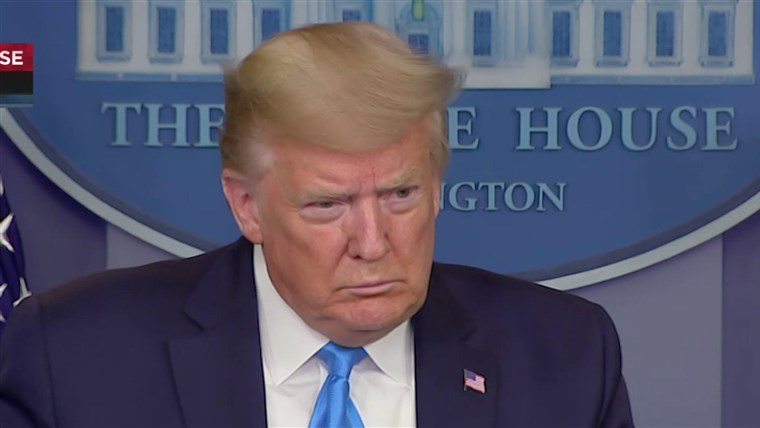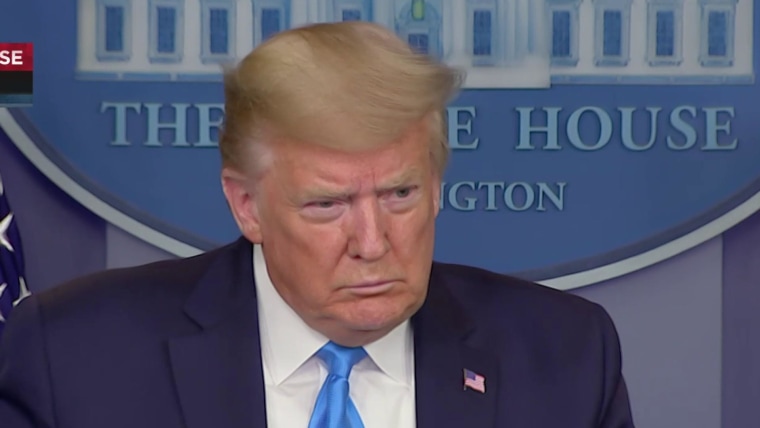In a stunning series of events, a coronavirus health crisis among the crew of the aircraft carrier USS Theodore Roosevelt was transformed into a leadership and public relations disaster for the Trump administration and the United States Navy. In roughly seven days, Capt. Brett Crozier, commander of the Roosevelt, was relieved of his command by acting Navy Secretary Thomas Modly after sounding the alarm about the virus raging through his sailors; he was subsequently given a hero’s sendoff (captured on video). Next Modly traveled to Guam and delivered a profanity-laced speech to the Roosevelt’s crew (also captured on tape). After a massive backlash, Modly apologized and then resigned.
This entire sordid tale is only the latest chapter in the Trump administration’s attack on American civil-military relations.
But this entire sordid tale is only the latest chapter in the Trump administration’s attack on American civil-military relations. For his part, Trump said Modly’s resignation was “unselfish,” but added that he did not know him despite clear evidence to the contrary. It comes in the aftermath of other disturbing events dating to the very beginning of this administration. As Adm. Mike Mullen, chairman of the Joint Chiefs of Staff under Presidents Bush and Obama, observed, Modly had “become a vehicle for the president.”
Modly’s decision to relieve Crozier came despite the opposition of Adm. Michael Gilday, the chief of naval operations, and Gen. Mark Milley, the current chairman of the Joint Chiefs of Staff. Both recommended that the decision be left up to the military leadership. (Modly served in the Navy but retired from active duty in 1990 to attend business school.) Gilday and Milley further stressed that such a drastic step should not be taken until an investigation had been conducted.
But Modly refused to wait. It has also been reported that he confided to an aide that Trump wanted Crozier fired and apparently also feared stalling would appear indecisive to the impatient commander-in-chief. Though the president has denied any involvement, his administration has a record of firing anyone who appears disloyal. It is clear the Trump administration values absolute loyalty — if not fealty — above all else. It was probably also not lost on Modly that he was acting secretary and had not been nominated to the Senate, and that he was the second Navy leader to leave in just the past six months.
Modly should have had a clear understanding of the military culture and its relationships with political authority. He graduated from the Naval Academy in 1983 and subsequently was an assistant professor of political science at the Air Force Academy. But in the future, this astonishing series of events may serve as a case study in leadership and civil-military relations at war colleges and military academies.
Officers are taught from the beginning of their military careers that the profession is apolitical. The oath they swear is not to the president, despite the fact that he is the commander-in-chief. Rather it is to “support and defend the Constitution of the United States against all enemies foreign and domestic.” This forms the basis of civil-military relations, and it has served America well for over two centuries. It is likely that few Americans realize the United States is only one of handful of countries that has never experienced a serious military threat to civil authority.
Not coincidentally, the nation’s Founding Fathers were very suspect of the military. They viewed it as a threat to civil authority.
Get the think newsletter.
Not coincidentally, the nation’s Founding Fathers were very suspect of the military. They viewed it as a threat to civil authority and the democracy they were attempting to create. Consequently, throughout most of our history the standing military remained relatively small. At the onset of World War II, the U.S. military was the 19th largest force on the planet — smaller than Portugal. But in that conflict’s aftermath, American political leaders accepted both global leadership and the associated responsibilities that required a large standing military force.
Want more articles like this? Sign up for the THINK newsletter to get updates on the week’s most important political analysis
The relationship between the civil authority of the nation and its military authority rests on a normative assumption that civilian control of the military is preferable to military control of the state. The principal problem that studies of civil-military relations look at is empirical: to explain how civilian control over the military is established and maintained. In essence, how does the military protect society without threatening it?
The answer to this critical question rests in an implicit “contract” between the professional military and civilian leadership based on mutual respect, trust and consultation. The military is allowed autonomy over decisions within its professional jurisdiction. Its leaders also expect to be consulted on matters of national security and provide their unbridled but apolitical advice to civilian leadership — while accepting that final decisions rest with those selected by the American people.
But the civil-military relationship is also dynamic. It is affected by the ongoing security environment and the evolution of warfare. The United States was already confronted by unprecedented emerging threats prior to this pandemic. These included cyberwarfare, nuclear proliferation, the rise of right-wing populism, failed states and terrorism. All these threats are complex and placed new strains on the civil-military relationship.
At the onset of the Trump administration, many believed that the new president would enjoy a solid relationship with the American military. They pointed to increases in defense spending, his selection of several retired generals for senior positions and the loosening of rules of engagement in combat.
But there were ominous signs as well. In the aftermath of the deadly white supremacist rally in Charlottesville, Virginia, in August 2017, Trump famously commented that “there were good people on both sides.” The service chiefs, however, immediately disassociated themselves from their commander-in-chief. They publicly condemned racism, extremism and hatred. A few weeks later Trump launched his initial attacks on Sen. John McCain, R-Ariz., who was held in high esteem as a war hero by the uniformed military.
In less than three years, Trump has fired all the retired military officers in senior roles (McMasters, Mattis, and Kelly) and sought to criticize if not humiliate each of them following their departure.
Relations with the military were further exacerbated by numerous events. Four of the most telling include:
- The president suspending military exercises with South Korea and unilaterally withdrawing American forces from Syria without any apparent consultations with either the civilian or uniformed military leadership. The latter resulted in the resignation of Secretary of Defense James Mattis.
- An infamous Pentagon briefing in July 2017 during which the joint chiefs and the secretary of defense attempted to explain the nation’s security alliances to the president. Trump quickly became angry and called the decorated officers around the conference table “losers.” He further said that “you don’t know how to win anymore.”
- The president’s decision to interfere in the military judicial process concerning those charged with war crimes. This interference reached its peak with Trump’s not only pardoning two officers but restoring the rank of Navy SEAL Eddie Gallagher who was accused of killing an ISIS detainee with a knife and convicted of a lesser charge. Trump even inserted himself into an administrative review to determine whether Gallagher should forfeit his SEAL status, a controversy that resulted in the firing of Secretary of the Navy Richard Spencer.
- Trump ordered Army Lt. Col. Alexander Vindman, an Iraq war veteran, fired from the National Security Council for testifying before the congressional impeachment investigation. Trump also had Vindman’s twin brother removed, who while a member of the NSC staff had nothing to do with the impeachment investigation. They were summarily (and unnecessarily) escorted to the main gate of the White House in an obvious attempt to both send a message and humiliate. The president further suggested that the military launch disciplinary actions against Vindman, a suggestion that was ignored.
The implications of these events and many others are extremely dangerous and worrisome. Prior to our current crisis, some argued that the military and those retired officers who occupied senior administration positions exercised “respectful disobedience” in order to appear supportive while keeping Trump’s worst excesses at bay. While opponents of the president might find solace in these efforts, they still threaten the vital civil-military balance. Furthermore, those experienced retired military leaders have all since departed the administration and been replaced by Trump loyalists like Modly.
Equally concerning is the way the Trump administration has established new norms for the politicization of the military. These have included involving senior retired officers in political campaigns, urging troops to lobby Congress, deploying forces to the Mexican border to underscore a political statement, and using funds appropriated by the Congress for the military for pet projects.
Recently Trump has described himself as a “wartime president,” and there is speculation that the number of dead from COVID-19 may exceed any of our previous wars except World War II or the Civil War. As we seek to flatten the coronavirus curve while preparing for an acrimonious national election, critical questions must be posed. If there were another crisis, will military leadership at all levels be willing to speak truth to power?
Is it not likely that during this moment of national crisis an erratic president, concerned by his sinking popularity, might be tempted to further politicize the military to support his re-election? Could this result in his exporting the national political divisions that have sustained him to the military? Could the leadership climate that resulted in the USS Roosevelt fiasco reach a point where the espoused political affiliation of not only civilian leaders, but also military officers, have more to do with his or her advancement than their ability? Sadly, this is not just the story of a political appointee who allowed his ambition to override his good judgment. Rather it is a warning about a growing threat to a foundation of American democracy.
Related:







